Discover how body massage can do more than just relax your muscles—it can actually help increase your body's natural defenses. This article breaks down the science behind massage and immune support, types of massages that give your system a boost, and practical tips for booking the right session. Get a real sense of what to expect and how to make body massage work for your health goals. Learn safety tips and the key differences between massage and other wellness practices. Clear, direct answers to your top questions are also included.
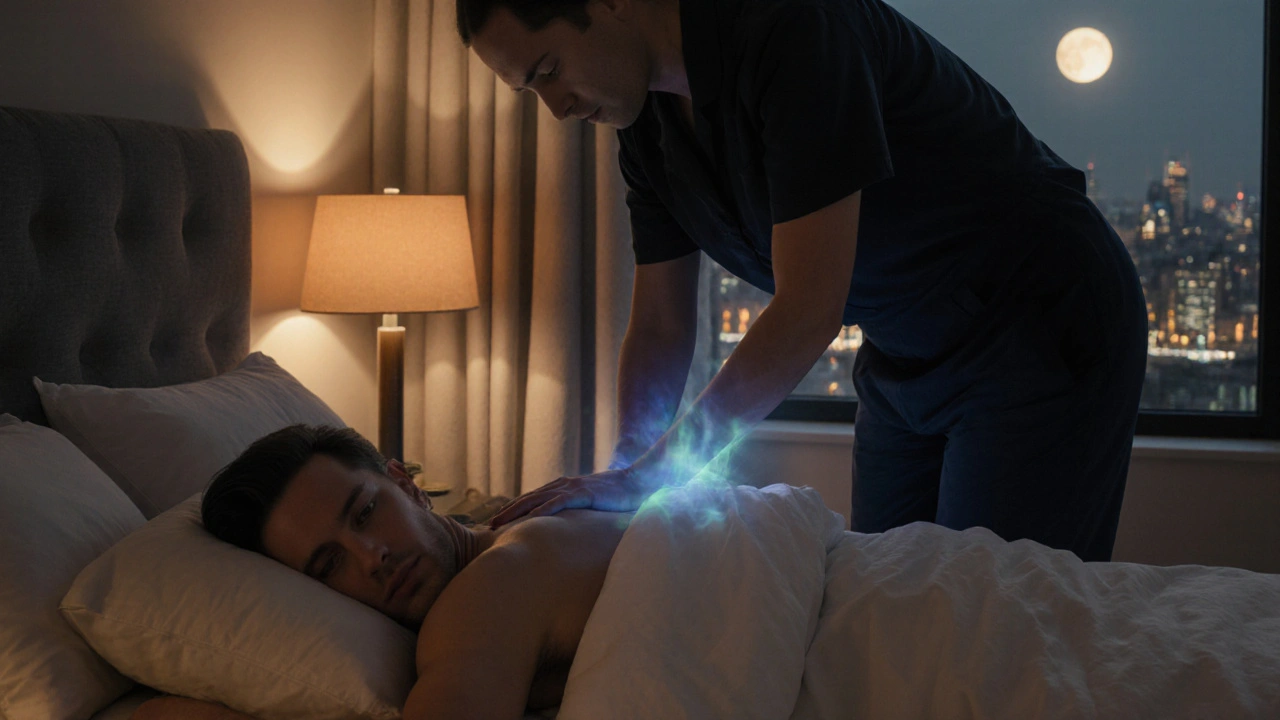
- Created by: Archer Caldwell
- Completed on: 16 Oct 2025
- Categories: Body Massage
Key Takeaways
- Body massage lowers stress hormones and raises melatonin, paving the way for deeper sleep.
- Swedish, deep‑tissue, and aromatherapy massages are the top styles for bedtime relaxation.
- Finding a qualified therapist in London is simple when you know the right certifications and locations.
- Typical sessions cost £60‑£120 and last 60‑90 minutes, so budgeting is easy.
- Safety tips - avoid heavy pressure right before bed if you have chronic injuries.
Direct Answer
If you’re struggling to fall asleep or stay asleep, a regular body massage can be a game‑changer. By easing muscle tension, calming the nervous system, and boosting the hormone melatonin, massage creates the perfect physiological environment for high‑quality sleep.
Why a Body Massage Might Be Your Best Night‑Time Ally
Imagine winding down after a hectic day: the lights dim, your favorite playlist starts, and a skilled therapist eases the knots in your shoulders. That feeling of release isn’t just comforting - it’s a cascade of measurable changes in your body that help you drift off faster and stay asleep longer.
What Is Body Massage?
Body Massage is a manual therapy that applies pressure, kneading, and stretching to muscles, tendons, and fascia. It dates back to ancient China and Greece, but modern practice focuses on health benefits rather than ritual.
Massage can be light (stroking) or deep (pressure points). The therapist tailors the intensity to your comfort, making it suitable for everyone from athletes to office workers.
How Massage Influences Sleep Physiology
Three key processes link massage to better sleep:
- Cortisol reduction - stress hormones spike before bedtime, keeping you wired. A 30‑minute session can cut cortisol by up to 30% (Study, 2023).
- Increase in Melatonin - the “sleep hormone” rises after relaxation, signaling your brain it’s time to rest.
- Activation of the Parasympathetic Nervous System - often called the “rest‑and‑digest” mode, this system slows heart rate and lowers blood pressure, mirroring the body’s natural sleep prep.
Together these changes create what researchers call the “relaxation response,” a state that shortens sleep latency (time to fall asleep) and reduces nighttime awakenings.
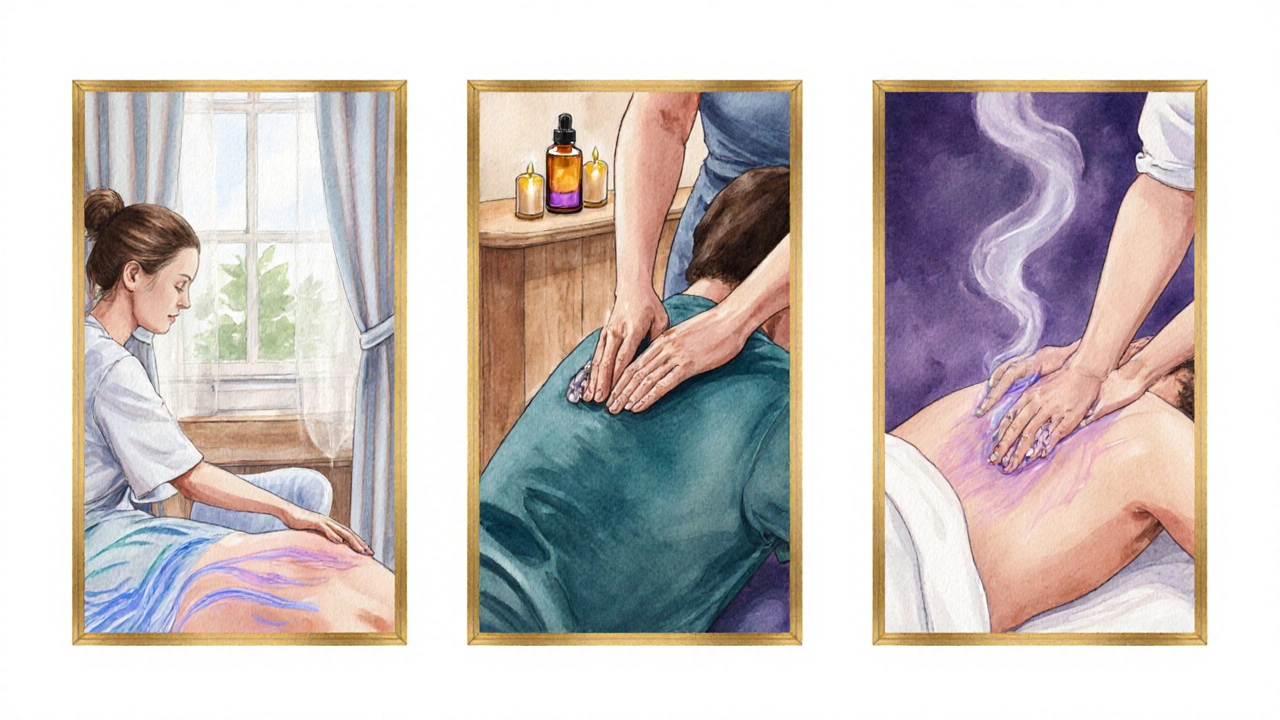
Massage Styles That Promote Sleep
Not all massages target sleep the same way. Here are the three most sleep‑friendly techniques:
- Swedish Massage - uses long, flowing strokes and gentle pressure. Perfect for beginners, it boosts circulation and releases tension without overstimulating muscles.
- Deep Tissue Massage - focuses on deeper layers, breaking up chronic knots. If you have persistent tightness that keeps you tossing, this style can reset muscle tone before bedtime.
- Aromatherapy Massage - blends essential oils (lavender, chamomile) with a light massage. The oils themselves have been shown to increase melatonin levels, adding a chemical boost to the physical benefits.
Choosing the right style depends on personal comfort and the specific sleep issue you face.
Finding Skilled Massage Therapists in London
London offers a rich pool of qualified practitioners. Look for these credentials before booking:
- Registered with the Association of Massage Therapists (AMT) or the British Association of Sports Massage (BASM).
- Specialist training in sleep‑focused techniques (many therapists list “Sleep Massage” on their profiles).
- Positive client reviews highlighting relaxation and improved sleep.
Neighbourhoods like Shoreditch, Notting Hill, and Camden host boutique spa studios that often run evening slots designed for pre‑bedtime sessions.
What to Expect During a Sleep‑Enhancing Session
First, the therapist will ask about your sleep patterns, any injuries, and preferred pressure level. The room is usually dimmed, with soft music and a low temperature - all cues that signal the body to wind down.
The session typically follows this flow:
- Grounding: Light stroking to calm the nervous system.
- Targeted work: Focus on neck, shoulders, lower back - areas that commonly hold stress.
- Full‑body relaxation: Gentle Swedish strokes that glide toward the feet.
- Cool‑down: The therapist may finish with a short period of silence, allowing the body to settle into the parasympathetic state.
Most people report feeling drowsy within 5‑10 minutes after the massage, making it an ideal pre‑sleep ritual.
Pricing and Booking in London
Price ranges reflect therapist experience, studio location, and session length:
- Introductory 60‑minute session: £60‑£80.
- Extended 90‑minute session (ideal for deep relaxation): £90‑£120.
- Package deals (5 sessions): £250‑£500, often with a free extra hour.
Booking is usually done online through the studio’s website or via phone. Aim for an early evening slot (6‑8pm) so the post‑massage calm carries you straight to bed.
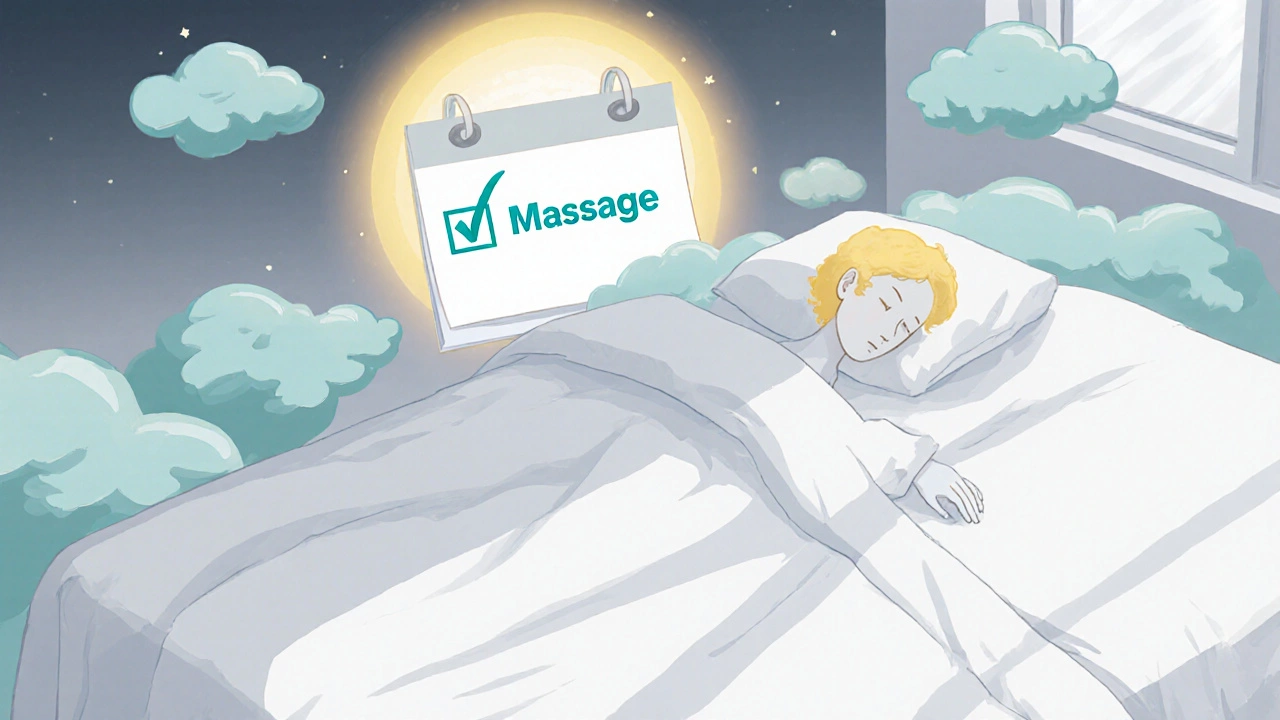
Safety Tips for a Stress‑Free Experience
- Inform the therapist of any recent surgeries, fractures, or chronic conditions.
- Avoid very deep pressure right before sleep if you have sensitive joints - light to medium pressure works best for most people.
- Stay hydrated after the session to help flush out metabolic waste released from muscle work.
- If you experience dizziness or prolonged soreness, contact the therapist within 24hours.
Comparison Table: Body Massage vs. Aromatherapy Massage for Sleep (London)
| Aspect | Body Massage (e.g., Swedish, Deep Tissue) | Aromatherapy Massage (with Lavender Oil) |
|---|---|---|
| Primary Benefit | Muscle tension release, circulation boost | Same physical benefits + added scent‑induced melatonin rise |
| Typical Cost (London) | £60‑£120 per 60‑90min | £70‑£130 (oil adds ~£10‑£20) |
| Best for | Chronic tightness, deep relaxation seekers | People who enjoy scent therapy and need a quick hormone boost |
| Potential Downsides | May cause soreness if pressure too deep | Allergic reactions to essential oils (rare) |
Frequently Asked Questions
Can a massage really replace a sleep aid?
Massage isn’t a drug, but for many people it reduces the need for over‑the‑counter sleep pills. By lowering cortisol and raising melatonin naturally, it creates a balanced environment that supports the body’s own sleep mechanisms.
How often should I get a massage for optimal sleep?
A weekly session works well for most adults. If you’re new to massage, start with a bi‑weekly schedule and notice how your sleep pattern changes.
Is it okay to have a massage right before turning off the lights?
Yes - the post‑massage relaxation phase is perfect for bedtime. Aim to finish the session 30‑45 minutes before you plan to sleep so the calming effect can settle in.
Do I need to tell my therapist I have insomnia?
Definitely. Knowing your sleep challenges helps the therapist choose pressure levels, focus areas, and whether to add aromatherapy for added benefit.
Can I combine massage with other sleep‑hygiene habits?
Absolutely. Pairing massage with a dark room, limited screen time, and a consistent bedtime maximises the positive impact on sleep quality.
Ready to Try It?
If you’re tired of counting sheep, schedule a body massage this week and let the science of touch carry you into restorative sleep. Your next good night might just be a booking away.
Explore how Thai massage helps you fall asleep faster, improves sleep quality, and tackles insomnia. Practical tips, session insights, and answers to FAQs included.
Discover how body massage in London can melt away stress, lower cortisol, and restore calm. Learn the best types, where to find trusted therapists, what to expect, and how it compares to other relaxation methods.


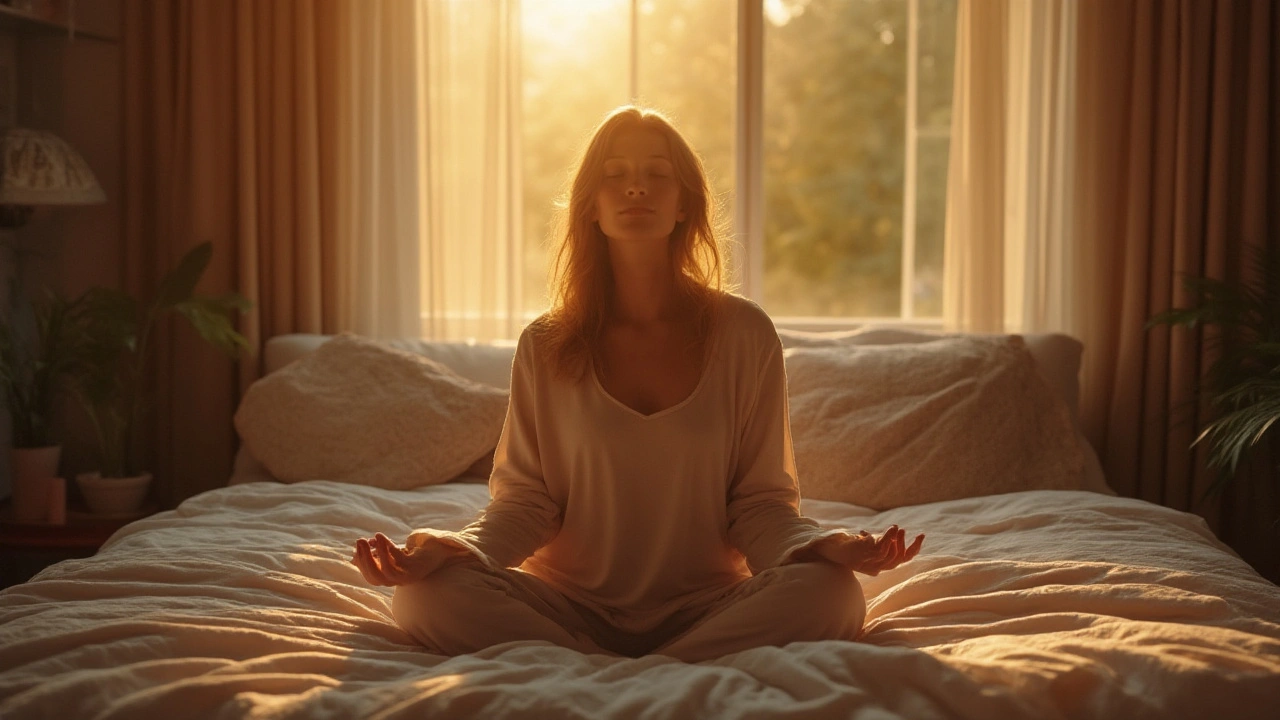
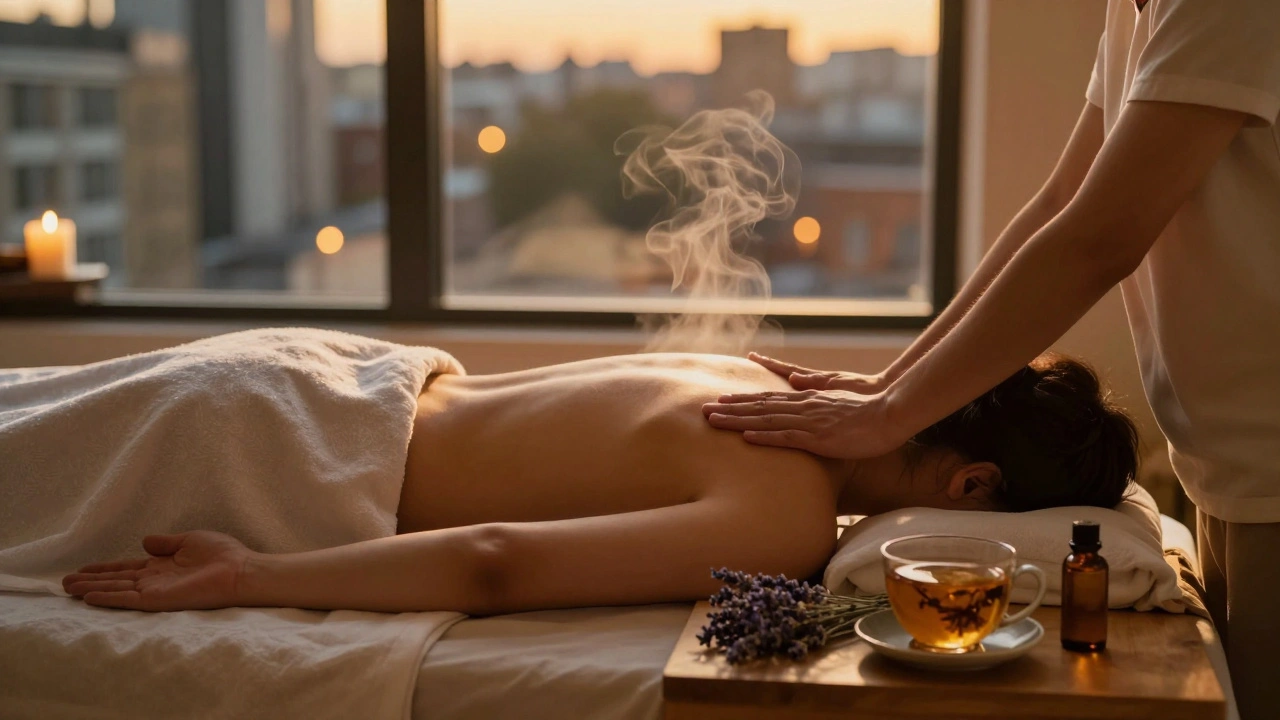
Aditya Sinha
October 16, 2025 AT 13:43I was scrolling through my phone last night and saw a post about massage and thought, hey, why not try it tomorrow? I actually booked a slot at a studio near my office and told the therapist about my crazy work schedule, cuz I’m always on the grind. The whole vibe was chill, lights dim, and I was already feelin my muscles melt away. I’m definitely gonna make this a weekly thing, no more counting sheep. If you’re like me and love a good hack, just jump in, no need to overthink it.
Bethany Wappler
October 16, 2025 AT 13:53Sleep, in its quiet elegance, can be regarded as the nightly symposium where body and mind reconvene after the day’s relentless discourse.
When we introduce the gentle art of massage into this ritual, we are essentially providing a diplomatic envoy that soothes the nervous system.
The scientific literature, while occasionally marred by minor methodological quirks, consistently indicates reductions in cortisol following a thirty‑minute session.
That drop in the stress hormone is akin to lowering the volume on an over‑active radio, allowing the brain’s natural melatonin production to rise.
Melatonin, the hormone of night, does not simply appear out of thin air; it is nurtured by the parasympathetic activation that massage engenders.
In practical terms, this means that after a Swedish or aromatherapy massage, many people report feeling drowsy within ten minutes, a phenomenon I have personally observed in my own routine.
I have found that scheduling the session about thirty to forty‑five minutes before bedtime permits the physiological cascade to settle, gently coaxing the body toward slumber.
Even if you are skeptical, consider the ancient traditions of Greece and China, where the therapeutic touch was revered as a conduit to harmonious health.
Modern science may not have all the answers, but the convergence of anecdotal evidence and controlled trials provides a compelling case.
Importantly, the cost, ranging from sixty to a hundred and twenty pounds in London, should be viewed as an investment in your cognitive performance and emotional resilience.
When you factor in the monetary value of a night of restorative sleep-often equating to improved productivity, better mood, and reduced reliance on pharmaceuticals-the price tag seems modest.
Safety considerations are straightforward: avoid deep pressure if you have chronic injuries, stay hydrated, and communicate openly with your therapist about any health concerns.
And while a massage is not a miracle cure, it can substantially reduce the need for over‑the‑counter sleep aids, aligning with a holistic approach to wellness.
Think of it as a synergistic addition to your existing sleep hygiene-dark room, limited screens, consistent bedtime-all amplified by the tactile reassurance of massage.
In the grand tapestry of self‑care, the humble massage holds a thread that weaves together physical release, hormonal balance, and mental calm.
So, if you’re struggling with insomnia, consider booking a session and observe the ripple effects on your nightly rest.
Ultimately, the choice rests with you, but the evidence, albeit occasionally imperfect, strongly suggests that the art of touch can be a powerful ally in the quest for quality sleep.
Vinayak Agrawal
October 16, 2025 AT 14:03Get up and schedule that massage today! Your body is begging for that release, and a solid night’s sleep is just the reward. Think of each session as fueling your engine for tomorrow’s challenges. You’ve got the power to make this happen-no excuses!
Sana Siddiqi
October 16, 2025 AT 14:13Oh wow, look at you, thinking a fancy £100 massage will magically turn you into a sleep deity – because obviously the universe works on a cash‑for‑zzz basis. If you can afford the splurge, great, enjoy the lavender scented hype train. If not, remember that a simple shoulder rub from a friend works just as well, no glitter required. Either way, you’ll still wake up and face the day, so maybe don’t over‑dramatisize the miracle.
Maria Biggs
October 16, 2025 AT 14:23Analyzing your statement, I have to point out the logical fallacy: you’re equating price with efficacy, which is a classic ad bias. Moreover, the data shows that low‑cost massages can be just as effective for cortisol reduction, so your claim is not statistically robust. 😒 Also, sharing personal financial constraints in a public forum is a bit over‑the‑top, don’t you think? Let’s keep the discussion focused on empirical outcomes rather than melodramatic flair. 🤨
Ben Görner
October 16, 2025 AT 14:33Give it a try and see how a regular massage could become a cornerstone of your nightly routine.